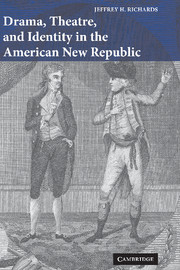Book contents
PART I - Staging revolution at the margins of celebration
Published online by Cambridge University Press: 22 September 2009
Summary
The five chapters in this first section examine plays that have something to do with the American Revolution, but none of the focus plays truly celebrates a thorough-going nationalism, the sort of thing one might have encountered in a July 4 parade. Even plays that basically affirm the Revolution encode some doubt about what precisely is to be the character of the American people either during the conflict or when the war is over. With the exception of William Dunlap's André, the plays discussed below for the most part have not been examined in detail by scholars of the drama, yet each one presents a document saturated with matters of identity. From Crèvecoeur's and Munford's closet plays to Murray's stage comedy and Dunlap's acted tragedy to the British musical by O'Keeffe, the Revolution gets sometimes a nod, sometimes a straight look, but rarely would a reader or spectator be left with much in the way of glory or the illusion of political consensus in the United States. From the 1770s through the 1790s, identity in these plays cannot be separated from the anxiety of separation generated by independence. For not only does one nation split from another, but the drama itself threatens to fracture, as authors attempt to bridge the gap between a once unified, if contentious, space, the pre-war British American stage, and the new incarnation of two separate national theatres, as writers and audiences encounter the uncertainties of form and substance the Revolution inevitably provokes.
- Type
- Chapter
- Information
- Publisher: Cambridge University PressPrint publication year: 2005



